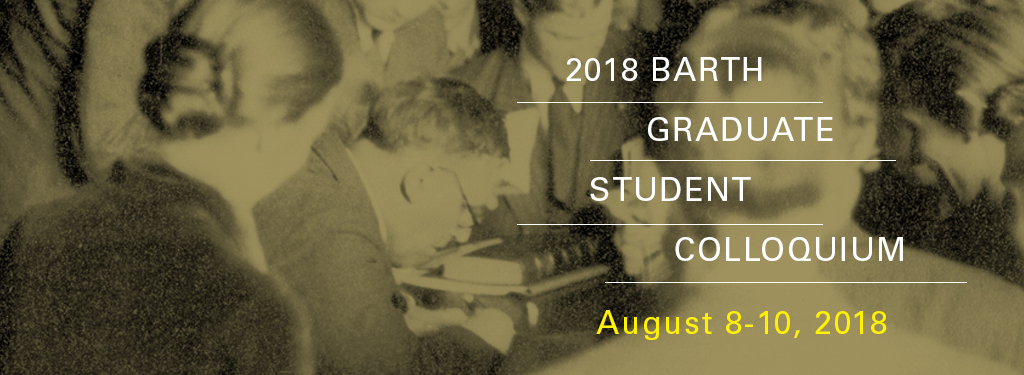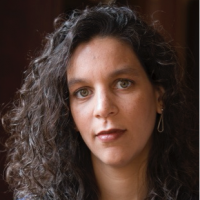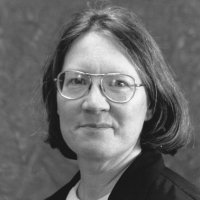
Date
Time
2018 Barth Graduate Student Colloquium

The Center for Barth Studies at Princeton Theological Seminary is pleased to announce the third Karl Barth Graduate Student Colloquium to be held on August 8-10, 2018. Over the course of three days, participants will have the opportunity to engage in an intensive student-led seminar on the first half of Barth’s Römerbrief (The Epistle to the Romans), while getting to know other up-and-coming Barth scholars. During the day, participants will take turns presenting papers and leading group discussion on an assigned portion of the text. Two senior scholars, one theologian and one New Testament scholar, will supplement the student-led day sessions by providing evening lectures and opportunities to further the conversation.
We especially encourage women, people of color, international students, new voices, and other under-represented voices in the Barth discussion to submit proposals for this year’s colloquium.
Speakers
 Andrea White
Andrea White
Andrea C. White is Associate Professor of Theology and Culture at Union Theological Seminary in New York. Her forthcoming volumes are The Back of God: A Theology of Otherness in Karl Barth and Paul Ricoeur; The Scandal of Flesh: Black Women’s Bodies and God Politics; and a future edited volume with Fortress Press entitled Feminist and Womanist Theologies. She is Executive Director of the Society for the Study of Black Religion and co-chair of the American Academy of Religion Black Theology Group. She serves on the Karl Barth Society Advisory Board and several editorial boards, including the Journal for the American Academy of Religion. She earned a Ph.D. in theology from The University of Chicago and M.Div. with a concentration in philosophy of religion from Yale Divinity School.
A. Katherine Grieb
 The Rev’d Dr. A. Katherine Grieb is Meade Professor of Biblical Interpretation and New Testament at Virginia Theological Seminary in Alexandria, VA, where she has taught for the past twenty-four years. Previously, she taught for two years at Bangor Theological Seminary in Maine.
Dr. Grieb received a B.A. in philosophy and religion from Hollins University, a J.D. from Columbus School of Law at Catholic University of America, her M.Div. from Virginia Theological Seminary cum laude, her Ph.D. in religious studies (theology) with distinction from Yale University and an L.L.M. in canon law with distinction from Cardiff University in Wales. Ordained a deacon, then a priest, in the Diocese of Washington for the past 35 years, she serves as a member of the clergy team of St. Stephen and the Incarnation Episcopal Church. She is one of the Six Preachers appointed by the Archbishop of Canterbury and the Dean of Canterbury Cathedral and she has taught for two weeks annually at the Canterbury Scholars program there for a number of years.
Dr. Grieb has published several articles on Karl Barth’s theology and biblical interpretation. Her book, The Story of Romans: A Narrative Defense of God’s Righteousness, was published by Westminster John Knox in 2002. She co-edited The Word Leaps the Gap, published by Eerdmans in 2008. Dr. Grieb has been active in ecumenical and inter-faith conversations and especially in Anglican Communion, serving on the Inter Anglican Theological and Doctrinal Commission, the House of Bishops Theology Committee, and the Inter Anglican Standing Commission on Unity, Faith and Order. She was one of seven theologians asked by the Presiding Bishop of the Episcopal Church to write “To Set Our Hope on Christ” (2005), a response to the Windsor Report, after which she served on the Covenant Design Group of the Anglican Communion. She is currently at work on a book about Hebrews.
She enjoys listening to choral music (especially Bach) and blues, reading murder mysteries (especially those written by Anglican theologians), traveling, mediaeval and renaissance art and Marc Chagall’s biblical interpretation, and is always ready to learn more about Karl Barth.
The Rev’d Dr. A. Katherine Grieb is Meade Professor of Biblical Interpretation and New Testament at Virginia Theological Seminary in Alexandria, VA, where she has taught for the past twenty-four years. Previously, she taught for two years at Bangor Theological Seminary in Maine.
Dr. Grieb received a B.A. in philosophy and religion from Hollins University, a J.D. from Columbus School of Law at Catholic University of America, her M.Div. from Virginia Theological Seminary cum laude, her Ph.D. in religious studies (theology) with distinction from Yale University and an L.L.M. in canon law with distinction from Cardiff University in Wales. Ordained a deacon, then a priest, in the Diocese of Washington for the past 35 years, she serves as a member of the clergy team of St. Stephen and the Incarnation Episcopal Church. She is one of the Six Preachers appointed by the Archbishop of Canterbury and the Dean of Canterbury Cathedral and she has taught for two weeks annually at the Canterbury Scholars program there for a number of years.
Dr. Grieb has published several articles on Karl Barth’s theology and biblical interpretation. Her book, The Story of Romans: A Narrative Defense of God’s Righteousness, was published by Westminster John Knox in 2002. She co-edited The Word Leaps the Gap, published by Eerdmans in 2008. Dr. Grieb has been active in ecumenical and inter-faith conversations and especially in Anglican Communion, serving on the Inter Anglican Theological and Doctrinal Commission, the House of Bishops Theology Committee, and the Inter Anglican Standing Commission on Unity, Faith and Order. She was one of seven theologians asked by the Presiding Bishop of the Episcopal Church to write “To Set Our Hope on Christ” (2005), a response to the Windsor Report, after which she served on the Covenant Design Group of the Anglican Communion. She is currently at work on a book about Hebrews.
She enjoys listening to choral music (especially Bach) and blues, reading murder mysteries (especially those written by Anglican theologians), traveling, mediaeval and renaissance art and Marc Chagall’s biblical interpretation, and is always ready to learn more about Karl Barth.
Schedule
In many respects, the format of the colloquium will resemble an intensive classroom seminar. Over three days, twelve to fourteen doctoral students working on dissertation projects related to Karl Barth’s theology will gather at the Center for Barth Studies. Each participant will have been assigned a chapter from the first half of Barth’s Romerbrief (chapters 1-7). Students will take turns presenting thirty-minute papers in which they raise interpretive issues and push critical questions about their assigned texts. Each paper will lead into a thirty-minute discussion of the content of the paper, the questions posed, and any other issues the text brings forward. All participants are required to have read all of the primary texts under discussion in preparation for the colloquium.
While the seminar-style discussions will form the heart of the colloquium, two senior scholars will also be invited to lecture on a matter of their choosing that is related to the general topic of the colloquium. These lectures will take place on Wednesday and Thursday evening. While there is opportunity to engage with the senior scholars after their evening lectures, the senior scholars will not participate in the seminar portion of the colloquium.
The following schedule is tentative. It may change based on the number of participants and other factors.
WEDNESDAY, AUGUST 8
8:00 – 8:45 AM Breakfast (Mackay cafeteria)
8:45 – 9:30 AM Opening Remarks and Introductions
9:30 – 10:30 AM Presentation 1
10:30 – 11:00 AM Break with coffee and refreshments in Alumni Room (2nd Floor of Library)
11:00 – 12:00 PM Presentation 2
12:00 – 1:00 PM Lunch (Mackay cafeteria)
1:30 – 2:30 PM Presentation 3
2:30 – 3:00 PM Break with coffee and refreshments in Alumni Room (2nd Floor of Library)
3:00 – 4:00 PM Presentation 4
5:00 – 6:30 PM Dinner (Downtown Princeton)
7:00 – 9:00 PM Evening Lecture with a New Testament scholar (TBD)
THURSDAY, AUGUST 9
8:00 – 9:00 AM Breakfast (Mackay cafeteria)
9:15 – 10:15 AM Presentation 5
10:15 – 10:45 AM Break with coffee and refreshments in Alumni Room (2nd Floor of Library)
10:45 – 11:45 AM Presentation 6
12:00 – 1:00 PM Lunch (Mackay cafeteria)
1:30 – 2:30 PM Presentation 7
2:30 – 3:00 PM Break with coffee and refreshments in Alumni Room (2nd Floor of Library)
3:00 – 4:00 PM Presentation 8
4:00 – 5:00 PM BREAK
5:00 – 6:30 PM Dinner (Downtown Princeton)
7:00 – 9:00 PM Evening Lecture with Andrea White
FRIDAY, AUGUST 10
8:00 – 9:00 AM Breakfast (Mackay cafeteria)
9:15 – 10:15 AM Presentation 9
10:15 – 10:45 AM Break with coffee and refreshments in Alumni Room (2nd Floor of Library)
11:00 – 12:00 PM Presentation 10
12:00 – 1:00 PM Lunch (Mackay Cafeteria)
1:00 – 2:00 PM Presentation 11
2:00 – 2:15 PM Brief break with coffee and refreshments in Alumni Room (2nd Floor of Library)
2:15 – 3:30 PM Presentation 12 and closing remarks
Call for Applications
The Center for Barth Studies at Princeton Theological Seminary is pleased to announce the third Karl Barth Graduate Student Colloquium. Over the course of three days, participants will have the opportunity to engage in an intensive student-led seminar on a portion of Barth’s Church Dogmatics, while getting to know other up-and-coming Barth scholars. During the day, each participant will take turns presenting a paper and leading a discussion on an assigned text. A senior scholar will supplement the student-led day sessions with an evening lecture followed by an opportunity for conversation.
The text for the 2018 colloquium will be the Romerbrief (The Epistle to the Romans) focusing on the first half of Barth’s commentary. We are inviting doctoral students and recent graduates in the disciplines of theology and ethics as well as New Testament studies to each present on each chapter of the Römerbrief. We will cover chapters one through seven. We hope that this set-up will foster fruitful interdisciplinary conversations between theological and New Testament studies. Through close, critical readings of the text, the 2018 colloquium seeks to explore various aspects of Barth’s reading of Romans in order not only to comprehend Barth’s theology better, but to discern what Barth’s constructive reading of Paul might offer for the academy and the church in the present and future.
Application Information: This colloquium is open to any doctoral student whose dissertation project interacts with some aspect of Karl Barth’s theology. A focus on the Romerbrief is not required. ABD is preferred. Recent graduates may apply. Applicants are required to submit a CV and a statement of interest no longer than 750 words explaining how participating in this colloquium would contribute to their research plans. Applications should be sent to barth.colloquium@ptsem.edu no later than Monday, April 23, 2018. Notification of acceptance will be made by May 1, 2018. Upon acceptance, participants will be assigned a single chapter from the Romerbrief (chapters 1-7) based on their preferences; for the colloquium, participants will then present a 20-25 minute paper and lead the discussion that follows. We especially encourage women, people of color, international students, new voices, and other under-represented voices in the Barth discussion to submit proposals for this year’s colloquium.
Cost: The colloquium begins Wednesday morning and concludes on Friday afternoon. All food and lodging at the colloquium will be provided. Travel stipends may become available.
Questions?: For more information go to barth.ptsem.edu/bgsc or email barth.colloquium@ptsem.edu.
Lodging
Lodging will be available again this year at Princeton Seminary’s Erdman Center. Details about the Erdman Center can be found here. The nightly lodging rates range from $55-$90 depending upon the room you choose. Please note that the conference will begin early on Thursday morning so we advise a Wednesday night stay.The registration fee does not include lodging charges. All charges for lodging at the Erdman Center are separate and paid upon arrival at the Erdman Center.
We will update this page if lodging becomes full at the Erdman Center. In the event that this happens, rooms will be reserved at a nearby hotel with a shuttle bus service to Princeton Seminary’s campus.
Maps & Directions
By Air
From Newark Liberty International Airport
The Olympic Airporter shuttle service takes you to the Nassau Inn in Princeton; call for schedule and reservations: 800.822.9797 (within the United States) or 732.938.6666 (outside the United States), or visit www.olympicairporter.com
The AirTrain takes you from all airport terminals to the Newark Liberty International Airport Train Station. Take New Jersey Transit southbound (Northeast Corridor Line) trains to Princeton Junction. From Princeton Junction take the train to Princeton Station.
From Philadelphia International Airport
Take the R1 High Speed Rail Line (entrance on pedestrian bridges and commercial roadway), limousine service (The Olympic Airporter; call for reservations: 800.822.9797 within the United States or 732.938.6666 outside the United States, or visit www.olympicairporter.com), or local taxi service to 30th Street Station in Philadelphia, where you can purchase a SEPTA/New Jersey Transit ticket to take a SEPTA train to Trenton and a New Jersey Transit train to Princeton Junction. From Princeton Junction take the train to Princeton Station.
By Bus
From Port Authority Bus Terminal in New York City (41st Street and 8th Avenue)
Purchase a Suburban Transit bus ticket to Princeton at windows 16 through 19 on the first floor. Board the bus on the third floor (fourth level) at gates 420 through 422. The bus leaves every half hour between 6:00 a.m. and 11:00 p.m. on weekdays and between 9:00 a.m. and 11:00 p.m. on weekends, and every half hour on the hour until 1:00 a.m. The trip is one and one-half hours. Ask the driver to let you off at the end of Nassau Street where it meets Mercer Street and Route 206 in Princeton, and walk to the Seminary.
By Train
From New York City (and north) and Philadelphia (and south)
New Jersey Transit services Princeton from the north (New York City, Newark), with connecting service from the south (Trenton, Philadelphia, Baltimore, Washington DC). Amtrak trains stop in Trenton, and some at Princeton Junction.
By Car
From the North/New York City
Take the New Jersey Turnpike South to Exit 9 (New Brunswick). After the tollbooths, bear right onto the ramp for Route 18 North. Shortly after getting onto Route 18 North the road will fork; stay to the left of the fork, in the right lane. Bear right onto this exit for Route 1 South/Trenton. Follow Route 1 South to Alexander Road (Princeton). Turn right onto Alexander Road and continue to the entrance of Princeton Seminary, which is the first left turn after College Road (Alexander Road will be Alexander Street at this point).
From the West
Take I-78 East into New Jersey. Exit onto I-287 South toward Somerville. Follow signs for Routes 202/206 South. Travel south on 202 for a short distance and then follow signs for Route 206 South. You will go around a traffic circle. Continue south on Route 206 for about eighteen miles to Nassau Street (Route 27) in the center of Princeton. Turn left onto Nassau Street and the first right onto Mercer Street and continue to the main entrance of Princeton Seminary, which will be on your left.
From the South
From southern New Jersey take I-295 North (becomes I-95 South) to the “Princeton Pike North” exit and continue on Princeton Pike for approximately five miles. Immediately after passing Library Place (on the left), the main entrance to the campus will be on your right.
From the East
Take I-95 West toward Trenton to the exit for I-295 North (becomes I-95 South) to the “Princeton Pike North” exit and continue on Princeton Pike for approximately five miles. Immediately after passing Library Place (on the left), the main entrance to the campus will be on your right.
From Philadelphia
Take I-95 North into New Jersey and exit at “Princeton Pike North” and continue on Princeton Pike for approximately five miles. Immediately after passing Library Place (on the left), the main entrance to the campus will be on your right.
Contact
If you have any questions or concerns, email us at barth.center@ptsem.edu or call us at 609-524-1981.
Please allow at least three business days for an email response.

